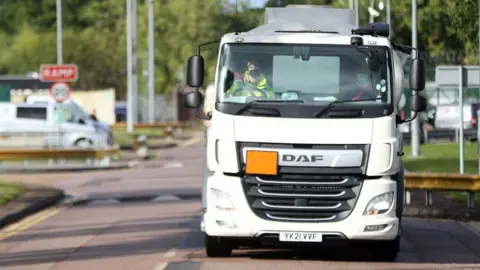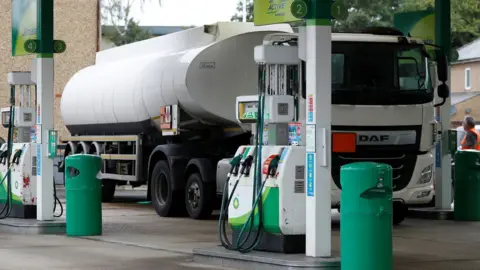Fuel stocks in South and London behind rest of UK
 Anadolu Agency
Anadolu AgencyFuel supplies to petrol stations in London and the south-east of England are improving but still remain behind the rest of the country, retailers say.
The Petrol Retailers Association (PRA) said 64% of forecourts in those areas had both types of fuel compared to 86% of sites nationally.
Supplies have increased in recent days after the military was deployed amid a shortage of fuel tanker drivers.
The government is offering 300 short-term visas to overseas lorry drivers.
Prime Minister Boris Johnson said 127 foreign drivers had applied for visas aimed at tackling shortages, however, the Department for Business said only 27 drivers had been identified. It has not confirmed what Mr Johnson's number was referring to.
The Times reported that just 27 people from the European Union had applied to be tanker drivers.
The PRA, which represents independent forecourts across the UK, said "steady deliveries and stabilising demand" had led to improvements in stocks across the country.
Gordon Balmer, PRA executive director, said 15% of sites in London and the south-east of England still had no fuel, down from 20% on Monday.
"Whilst there has been a significant reduction in dry sites, these areas are still lagging behind in having both grades of fuel available compared to the rest of the UK," he said.
Nationally, the percentage of dry sites increased from 8% to 11% on Tuesday, the PRA said.
"Members are reporting they are now receiving deliveries from military drivers using commercial tankers, however further action must be taken to address the needs of disproportionately affected areas."
 Reuters
ReutersBesides fuel drivers, the government is offering a further 4,700 temporary visas in total for foreign food lorry drivers, which will last from late October to the end of February, in an attempt to avoid other supply chain issues. It is not yet known how many people have applied to this scheme.
Mr Johnson said the slow rate of visa applications was a "fascinating illustration of the problem", which he added was a "global" issue, thought he admitted there was a "particular problem in the UK".
He said working in road haulage "should be a great job", but added that there had been an underinvestment in facilities and pay conditions.
He dismissed the suggestion that the problem was anything to do with Brexit. He noted the "supply chain problem is linked to recovery" and said other parts of the world were also affected.
"Imagine the UK has been in deep freeze and the pipes are unfreezing right now - stresses and strain of the economy waking up," Mr Johnson said.
The Road Haulage Association (RHA) said the small number of visa applications was the "proof in the pudding" that short-term visas were "not going to be attractive".
A spokesman for the trade body said that for visas to be an attractive proposition to overseas lorry drivers, they needed to last 12 months.
"The reality is that we have to assume these drivers from abroad are already in employment elsewhere. If visas are only three months... it's unlikely there is going to be much take up," he added.
Livia Spera, general secretary of the European Transport Workers' Federation, said she was "not surprised" drivers were not "rushing to sign up for visas".
"We already predicted and warned that short-term measures such as visas wouldn't work," she added.
Ms Spera said there was "no quick fix" to the problem. She said increasing driver wages and improving working conditions was the "only answer to the crisis".
 Anadolu Agency
Anadolu AgencyIn response to the prime minister's comments on roadside facilities, the RHA's Rod McKenzie said it was a "false premise" that a trade body could deal with the issue alone.
"The majority of hauliers are small companies, less than 10 lorries," he said. "It requires government commitment to facilitate the development of commercial sites.
"Government departments however have consistently ignored industry calls to press for cleaner and safer facilities on our roads."
Trade bodies have estimated the UK currently has a shortage of about 90,000 HGV drivers, which has been caused by several factors, including the coronavirus pandemic, Brexit and an ageing workforce.
The shortages have started to affect supply chains in recent months, with some supermarkets struggling to stock certain products and petrol stations being unable to stock enough fuel to meet demand.
The government has said temporary visas are not a long-term solution and has urged firms to invest in a UK workforce.
Mr Johnson said the UK economy could not "go back to the failed model where you mainline low-wage, low-skilled labour".
"It's time for investing in people and skills."
